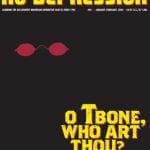Corey Harris – It’s all about showing my process of education
Corey Harris’ most recent public appearance probably reached the broadest audience he’s ever had. As our guide on journeys to meet music makers of the Mississippi Delta and West Africa in Martin Scorsese’s “Feel Like Going home” episode of the eight-part PBS series The Blues, Harris showed himself to be an eager student, an accomplished tour guide, and a ready collaborator with musicians as diverse — and related — as the late American fife and drum king Otha Turner and Malian singer Ali Farka Toure.
In the aftermath of the film’s journeys, Harris’ new disc, Mississippi To Mali, documents new music he’s made with Toure, bluesmen Bobby Rush and Sam Carr, and Turner’s granddaughter Sharde Thomas, who’s keeping the north Mississippi fife tradition alive. This varied music represents still more twists, and one more pot of steaming synthesis, for a striking young musician who first came to attention with his traditional acoustic blues discs of the mid-’90s, Between Midnight And Day and Fish Ain’t Bitin’.
Of the generation of young black bluesmen who showed up on disc at that time, Harris was the most convincing in having digested the acoustic blues traditions — and the horns introduced on his second CD gave early notice that he wasn’t about to be pinned down to any one style. His 1999 release Greens From The Garden was a further revelation, and a major statement. It featured the first recordings of his electric band, and the music was as influenced by Caribbean and African sources as homegrown ones. Intercut with snippets of dialogue and sounds, the disc featured a bunch of Harris originals, including one written in French.
Raised in the suburbs of Denver, where he had a semi-secret rock ‘n’ roll past, Harris was first noticed working as a street musician in New Orleans. His musical explorations have taken him far, in geography and in time, and even to some short side trips such as his contributions to the Wilco and Billy Bragg-led Woody Guthrie Mermaid Avenue project. He’s lived and worked out of Charlottesville, Virginia, for some years now, but as each of his seven discs have shown, lesson by lesson taken in and built upon, he’s not the sort of person to be nailed down to any one place.
I. I’VE NEVER CALLED MYSELF A BLUESMAN
NO DEPRESSION: It sometimes seems that if you stood on your head and sampled the sound of mustard greens cooking in a pot beside the river Niger — which you just about have — marketers would still put your next CD in the blues bin. Does that matter to you?
COREY HARRIS: Yeah, it does, in terms of how the music’s promoted.
ND: The blues audience can be pretty conservative. If you, or Chris Thomas King for another, move to include the modern, there can be accusations of “betrayal.”
CH: Yeah, there’s a lot of that. People do have a very static idea of the blues, of what it should be….You can fuse someone’s joints in their leg, till they’re ossified. And people are so used to these so-called genres that record companies have established over the years that they want artists to fit neatly into those little grooves.
There are a lot of stereotypes — of a person who’s in hip-hop, of a blues person — and if you don’t conform to that image and ideal, then people have a hard time with you….I’ve never called myself a bluesman; it would sound silly, because I know people who I think really are — B.B. King, or R.L. Burnside, Buddy Guy, people like that.
ND: Where it’s self-defined!
CH: Yeah. Though nowadays, if you go and say you’re a jazzman, it still really means something; but if you want to be a bluesman all you’ve gotta do is say so, learn one or two songs, and then you go and get a skinny tie and a hat!
ND: Can your unclassified roots music get played on the radio anywhere? Blues shows? Americana radio stations? Certainly not R&B/hip-hop stations!
CH: I don’t know where it gets played. I never hear it myself! Apparently somebody, somewhere, every now and then, plays it.
ND: So people are getting to know your music from live shows, and reports.
CH: That’s a large part of it. Touring, and also opening up for artists who are much more prominent. I’ve done a couple of tours with the Dave Matthews Band, where we played in humongous venues, outdoor shows.




